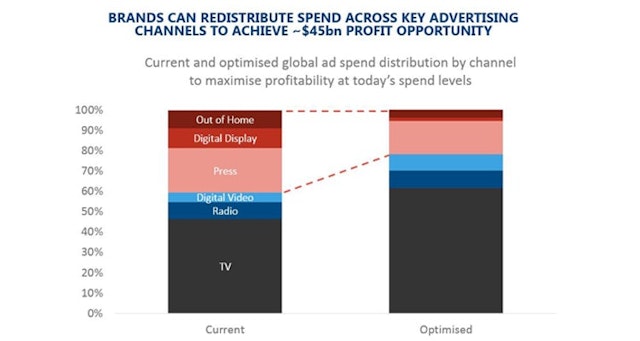‘Advertising is not the way’ – and other bullshit from Cannes
'Advertising is not the way going forward,' Mastercard chief marketing and communications officer Raja Rajamannar said last week at Cannes Lions. One question: how he can make such a claim with a straight face when so much easily-available information says the complete opposite?

Rajamannar explained by saying that "consumers hate interruption” and are increasing using ad-blocking software. "They are paying money to keep these pesky marketers out," he added.
Now, Rajamannar is correct – to a degree. I have already discussed the rise of ad blockers, script blockers and VPNs in the post-GDPR world. But he made the common mistake of taking a single digital trend and then applying it to the entire marketing world.
Advertising is part of the way forward
Take Nielsen’s recent release of the company’s first-ever CMO Report, which surveys top brand marketers. While the study dutifully looks into how they are changing their media spends, the most interesting finding is that different channels are now viewed as best for different purposes.
Sometimes it takes an official report to tell the industry what should have been obvious all along. Here is the summary:

Nielsen’s survey found that traditional media is best for brand building while digital has become the channels of choice for direct marketing and customer acquisition.
“High reach media—such as television and radio—fit nicely with brand awareness campaign objectives seeking to fill the top of the sales funnel,” the study states. “Whereas more direct response media—such as search and email—fit well with customer acquisition objectives seeking to convert lower-funnel prospects.”
In a prior column, I examined why advertising – strictly defined – over digital is practically useless. Nielsen’s finding makes sense because marketers are not actually moving their advertising spends from TV to online.
Now, based on the reports on Rajamannar’s talk, it seems that he used digital’s difficulties as proof that advertising as a whole is less important today. But digital remains only a small part of the advertising world.
Optimise for the best media mix
A new Ebiquity study released last week calculates that the marketing industry can generate $45bn in additional profit by optimising media budgets by decreasing spends on print, digital display, and outdoor while increasing investments in TV, radio, and digital video. No, television and radio are not dead:

For all of the talk from digital agencies and online marketing software sellers that marketers should be digital-first, it should be obvious by now that the internet is excellent for some things but terrible for others. As Ebiquity’s study and countless ad fraud reports have shown, online display advertising is a bigger waste of money than S Club 8 was in the early 2000s.
Faris Yakob rightly summarised the best media strategy in this recent tweet: “Buy the largest amount of highest-quality exposures against all category buyers for the lowest price.”
The “highest-quality exposures” do not occur online. I would not spend money on millions of useless “impressions” – most of which result from bot activity, criminals doing fraud, or media that is stopped by blockers. In other words, it is material that is never seen by human eyeballs and does nothing to build brands.
The agency Kantar Millward Brown, part of WPP’s data investment division, also released last week an analysis of the BrandZ global database stating that companies that are creative, disruptive, and do good advertising can increase brand value by as much as 265%.
“Over half of all buyers, in almost every category we study, select brands first and then consider price,” the study states. “On average, consumers pay 14% more for brands that they perceive to be meaningfully different.”
But tell me again that creative, mass advertising is not the way forward.
Other nonsense at Cannes Lions
Elsewhere at Cannes Lions, other major speakers seemingly tried to one-up each other in terms of who most supports the idea of brand purpose. (For the full coverage of the event from my colleagues at The Drum, you can go here.)
Mars chief marketing and customer officer Andrew Clarke said that “brands with a purpose get 30% more viewability on YouTube.” It is also obvious that feel-good “change the world” ads get more views. But my question: Do they actually result in more sales?
Twitter’s head of brand strategy, Stacey Minero, and other company marketers held a panel discussion on how brand purpose matters “now more than ever.” Well, if you go from zero to one out of 100, I suppose that counts.
Jon Wilkins, chairman of the ad agency Karmarama, said in an interview with Accenture Digital: "As we know, brands that are trusted regularly outperform and sell more, so trust ultimately is the goal of every marketer today... Brands that are trusted today tend to be those that stand for something... above and beyond the products they make."
If I had a glass of rosé every time that a marketer at Cannes Lions made a sweeping generalisation without any credible supporting evidence, this column would have made as much sense as the last act of Dude, Where’s My Car?
After all the silliness that was discussed at the event, Vice and the company’s creative agency, Virtue, win the Facepalm Lion award. Their unveiled study suggests that “brands should also think about incorporating a sense of spirituality into their marketing and overall brand ethos.”
The only brand that I want involved in my religious experiences is Durex.
In a prior column, I looked at research from Byron Sharp’s Ehrenberg-Bass Institute for Marketing Science showing that most consumers rarely give more than a passing thought to brands in their daily lives. “Marketers have to accept that our brand is a small part of the lives of most of our customers,” Sharp writes in his new textbook.
Why we hear so much silliness
Now, in contrast to the above useful studies that were released at the same time as Cannes Lions, I must wonder: what is it about the event that causes a bunch of presumably intelligent people to spout twaddle that means little at best or is completely wrong at worst?
I've got a theory – one that is definitely not bunnies. People in the marketing industry always need something, anything new to discuss. After all, the first rule in advertising is to get noticed among the competition by being different.
Everyone reading this column knows the gist of marketing. Do the customer-facing research. Create something that either fulfills a need or is something new that people will want. Decide whether and how much you will segment the market. Choose a value, mid-market, or premium price. Do the positioning and messaging. Determine how you will prioritize promotional tactics and media channels. Create and transmit the marcom collateral and measure the results.
But marketing conferences need to sell sponsorships and tickets – and it would be boring to repeat what everyone knows. The best way to build hype is to get people to talk about something supposedly new and earth-shattering – no matter how wrong it might be. It gets headlines and attention.
After all, making good advertising is hard – just ask Diet Coke and Fin – and not easily explainable in a single lecture because it is a complicated mix of art, science, economics, and psychology. It is much easier to talk about fluffy ideas such as “brand purpose.”
But the best advertising comes from having the best, real ideas that hold actual marketing water rather than being a result of drinking too much rosé. Jumping on trendy bandwagons to advocate for hypotheses that are completely unsupported by good evidence is the worst way to go.
Always ask for the evidence
Many studies that I cite in these columns come from companies such as Ebiquity, Forrester, Gartner, Enders Analysis, the Ehrenberg-Bass Institute, and the IPA in the UK. These companies do not sell products – they sell information. They live or die based on their reputations of supplying marketers with reputable, objective data.
While some of their studies are not completely credible in the scientific world – see below – they still stand far above much of what we see in the marketing industry.
Whenever marketers make unfounded assertions or state opinions as facts, everyone should ask one question: What is the evidence? (This practice also works for politicians, con artists, certain marketing speakers, and snake oil salesmen.) Every marketing trade journalist – as well as conference attendees who ask questions during Q&A sessions – should do this.
Too many marketers – specifically, those who sell products and services rather than information – create cheap surveys using free online tools, push traffic to them to maximize the number of responses, and then pretend that the results are scientifically valid and actually mean something. But having pretend information is worse than having no information.
Whenever marketers encounter such ludicrous statements or invalid studies, we should ask these four questions from Ad Contrarian Bob Hoffman: What controls did you use in your study? Did you repeat the study to verify it? Have you had peer review to substantiate your methodology and your conclusions? Did you have a third party replicate your study to validate it? (Hoffman was a science teacher in an earlier career.)
If the answer each question is not satisfactory, then the data or study is not scientifically valid. Remember that anytime that some marketer makes some broad proclamation – at Cannes Lions or elsewhere.
The Promotion Fix is an exclusive biweekly column for The Drum contributed by global marketing and technology keynote speaker Samuel Scott, a former journalist, consultant and director of marketing in the high-tech industry. Follow him on Twitter and Facebook. Scott is based out of Tel Aviv, Israel.

